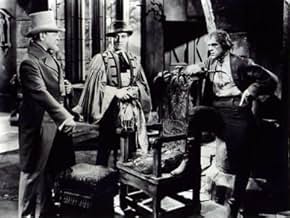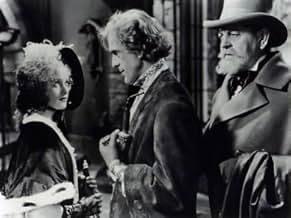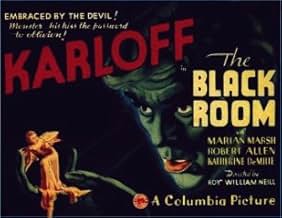Füge eine Handlung in deiner Sprache hinzuIgnoring an ancient prophecy, evil brother Gregor seeks to maintain his feudal power on his his Tyrolean estate by murdering and impersonating his benevolent younger twin.Ignoring an ancient prophecy, evil brother Gregor seeks to maintain his feudal power on his his Tyrolean estate by murdering and impersonating his benevolent younger twin.Ignoring an ancient prophecy, evil brother Gregor seeks to maintain his feudal power on his his Tyrolean estate by murdering and impersonating his benevolent younger twin.
- Mashka
- (as Katherine de Mille)
- Court Clerk
- (Nicht genannt)
- Anton as a Child
- (Nicht genannt)
- Franz - Captured Assassin-Villager
- (Nicht genannt)
- Gregor's Hairdresser
- (Nicht genannt)
- Karl - Lead Villager
- (Nicht genannt)
- Member of the Court
- (Nicht genannt)
- Member of the Court
- (Nicht genannt)
- Michael the Footman
- (Nicht genannt)
- Gatekeeper
- (Nicht genannt)
Empfohlene Bewertungen
An interesting star vehicle for Boris Karloff allowing him to play two roles as contrasting twins; the fact that one of them is deformed may owe something to Lon Chaney and here Karloff demonstrates himself a most worthy successor to the Master's mantle. The period setting - its-folk-tale quality hearkens back to German Expressionism - serves the handsome production extremely well, especially when considering that Columbia Pictures at the time was just starting to pose a serious challenge (following the Oscar sweep of Frank Capra's IT HAPPENED ONE NIGHT [1934]) to the major studios. Director Roy William Neill handles the proceedings with great efficiency and style providing plenty of visual flourishes along the way.
The only criticism one can level at the film regards a couple of slightly contrived plot points: the evil Karloff, who has done away with his benign but paralyzed sibling and whom he impersonates in order to win the girl he loves, is rather stupidly caught by the girl's father when he is spotted in a mirror using his 'lame' hand to sign the marriage contract; Karloff's come-uppance is brought about by his dead brother's faithful mastiff which hates his guts - it's implausible to think that the dog has kept away from Karloff for days (by which time the girl's lover has been convicted for her father's murder) only to conveniently reappear on his wedding day! However, the ironic climax - which allows the prophecy tied with Karloff's family name to be fulfilled - is a splendid one.
All in all, along with THE MASK OF FU MANCHU (1932) and THE WALKING DEAD (1936; see below), THE BLACK ROOM is Karloff's best vehicle of the 1930s which wasn't produced by the studio which made his name, Universal.
Karloff plays twin brothers (one good and one evil, naturally) who have a nasty family prophecy hanging over their heads, seemingly solved when a room inside their castle is sealed up. Also helping matters is the fact that Anton, the nice younger twin, travels the world for a while before being summoned home by his brother, a cruel despot who abuses his position of power. This leads to a great twist, but it won't be revealed here. Gregor, the evil twin, has his eye on beautiful young Thea (the radiant Marian Marsh), and intends to marry her despite the fact that she's already attached to another man, Lt. Lussan (Robert Allen), whom he frames for murder.
"The Black Room" does have its assets, but chief among them are the dual Karloff performances; he's superb at creating two very different personalities. His delicious villainy when he plays Gregor easily rivals his equally compelling turn in "The Body Snatcher" a decade later. Also doing creditable work are Thurston Hall, Katherine DeMille, John Buckler, and Henry Kolker. The dog, Thor, is great too.
Highly recommended to Karloff fans.
Eight out of 10.
The room itself was ordered sealed shortly after the birth of the twins in order to avert a repeat of the tragedy. Unbeknownst to the villagers, Gregor has found a hidden passage into the black room, and it is the torture pit of the room where he disposes of the bodies of his victims.
Anton, the younger brother, returns home upon the urging of his brother Gregor, who has, after several attempts on his life, realized that he must step aside in order to calm the people down. Gregor has in mind a phoney abdication in which he seems to step aside in favor of his twin. His actual plan is to murder Anton, and to continue to reign in Anton's identity, in his own twist on the family curse. He falls over his own hubris for a number of personal reasons, but before film's end, he manages to indulge in a round of crafty Karloffian mayhem.
Karloff plays both the monstrous and benign brothers, but in addition, he portrays the nasty brother imitating the gentle one. That's what makes this piece fun. Seventy minutes of the grand old man of the gothics at his best. I've probably seen it about thirty times now, and it holds up well.
Well I hate to point this out to a long dead actor but Karloff can really act. The Black Room is a tour de force performance.
Karloff plays three roles (two twins and one twin pretending to be the other) and manages to give them such a distinctive nuanced performances I squinted at the screen to make sure it really was the same actor in the roles.
The story itself is quite a good set-up. With one brother a devilish tyrant with a taste for village girls and the other a slightly fey traveler with a birth defect. Hanging over their head is a family curse that states one brother will kill the other in the titular Black Room.
There are twists and turns and as many reviews have pointed out this is more a costume drama/mystery than straight horror film. The supporting cast is competent and the sets are well done but this is Karloff's show and he runs away with it.
Wusstest du schon
- WissenswertesPresent existent version, as presented on Turner Classic Movies, bears title and end credits redesigned for the 1955 wide screen re-release.
- PatzerThe film is set in the early 1800s, yet a statue of St. Therese of Lisieux (Therese Martin) is prominently displayed in the castle three times (at around 17 mins, 40 mins, and 47 mins). Therese Martin was not born until 1873. Furthermore, no statue of St. Therese was made or displayed until after she was canonized, in 1925.
- Zitate
Mashka: Don't you want to kiss me?
Baron Gregor de Bergmann: [Cutting a juicy pear with his knife and eating it as he talks] A pear is the best fruit!
Mashka: Every time you see her, you want to be rid of me.
Baron Gregor de Bergmann: [Seemingly ignoring her] Lots of juice in a pear!
Mashka: Well, you'll find out I'll not be got rid of so easily! Do you hear what I say?
Baron Gregor de Bergmann: Adam should've chosen a pear.
Mashka: You've got it all planned, haven't you? You're gonna marry her. You're gonna make her your wife, your baroness!
Baron Gregor de Bergmann: I like the feel of a pear! And when you're through with it...
[He carelessly tosses it across the room]
- VerbindungenFeatured in Monday Night Fright: The Black Room (1962)
Top-Auswahl
- How long is The Black Room?Powered by Alexa
Details
- Erscheinungsdatum
- Herkunftsland
- Sprache
- Auch bekannt als
- The Black Room
- Drehorte
- Culver City, Kalifornien, USA(Exterior Castle set and Exterior Tyrolean town at the RKO Forty Acres Backlot)
- Produktionsfirma
- Weitere beteiligte Unternehmen bei IMDbPro anzeigen
- Laufzeit
- 1 Std. 8 Min.(68 min)
- Farbe
- Seitenverhältnis
- 1.37 : 1



































